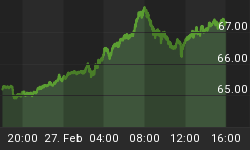The European Union's debt crisis, the threatened collapse of its fledgling 'euro' currency, and the uncertainties created by the UK elections may seem very far removed from the American ship of state, but, in reality, this turbulence threatens to capsize our fragile economy.
Greece is in the most immediate danger of default, followed closely thereafter by Portugal, Spain, and perhaps Italy. As the European Union overrides its own treaty agreements to offer bailouts to these 'PIGS,' global financial markets have panicked. Essentially what has happened is that the covenants and assumptions underlying one of the bedrock reserve currencies of international finance - and the presumed successor to the US dollar as primary reserve - have been broken. This requires a global re-rating of purchasing power risk. The problem is today's investors have few havens left.
The essential political model of most of the developed world has been to promise, promise, promise, and push any costs on to the next generation. These Mediterranean countries are starved for growth because their coddled union laborers sit around waiting to hit age 50, so they can collect a pension that pays as much as their working wage. It wasn't always this way, but politicians always find it safer to add benefits than take them away. Only a taxpayer revolt can install a reformer like Lady Thatcher or Ronald Reagan, and in Club Med, the belief is that only suckers pay taxes.
Much as in the United States, European leaders embraced debt as the only escape. Originally, Greece estimated its debt at some $12 billion. As the truth was exposed, this rose to $37 billion and then to $130 billion! As Greece represents just 2 percent of the 27-nation EU economy, it is only speculation as to how many trillions of dollars it would take to rescue massive, ailing members like Spain, Italy, the UK, and even France. Apparently, European politicians are prepared to walk that road rather than face any more Molotov cocktails.
However, cowardice also has consequences at the polls. For example, a "dump the incumbent" movement swept the recent UK elections, leaving an unlikely coalition of Conservatives and Liberal Democrats in its wake. In a sign of the times, the Conservatives were elected to put through budget reform, and the Lib Dems to prevent any major spending cuts. Since the UK economy can hardly sustain a greater tax burden, there seems to be no politically viable route to reducing the staggering debt left over from thirteen years of Labour government. And time is running out, as the major rating agencies have already signaled their readiness to take away Britain's triple-A credit rating. In short, after a brief honeymoon, the recent British election likely will continue Britain's path to financial breakdown.
In response to the uncertainty in Europe, investors have piled into US Treasuries, thereby driving up the US dollar in relative terms. The rush into the dollar is akin to the passengers on the Titanic streaming towards the stern as the ship began to sink by the bow. Although the rising aft decks offer the illusion of relative safety, in the end, the ship's stern plunged to the ocean floor even quicker than the bow. Only those who had secured refuge in the precious lifeboats survived; perhaps ancestors of today's gold investors?
It's worth noting that despite low inflation, a stable dollar, and an apparent rise in economic activity, the price of gold remains near record highs. This seems to indicate that there is a fairly sizable minority of investors who are not, in fact, fooled by the rising aft decks.
Meanwhile, it appears that the popular notion of US dollar safety persists among the bulk of investors - despite all the signs pointing to an upcoming dollar crisis. They seem to be missing two key facts: every problem facing Europe faces America in spades, and the euro crisis is putting the dollar in an even worse long-term position than before.
While it is troubling that the EU has chosen to risk its currency to bail out one irresponsible member-state, the US has already done the same for several of its states. A large part of President Obama's 'stimulus' effort involved providing stop-gap funds for bloated and bankrupt state governments. Before investors fled Greek debt, that country was burning through borrowed money at approximately the same rate as California is now (as measured by the annualized deficit-to-GDP ratio). Even after getting additional stimulus funds, the 'Golden' State was forced to issue IOUs to its workers in lieu of pay; how long before it issues them to its bondholders? If Washington, already trillions of dollars in debt, bails out California, its largest and wealthiest state, how long until it defaults too?
At least the eurozone has productive, savings-based, export-heavy economies like Germany to counterbalance the debtors. The United States has the curse of a common fiscal policy, meaning that we're all in the same sinking ship. We have no strong state economy that can come to the rescue of the others, only a Fed printing press.
As a result, we feel that this crisis has only served to create an even larger bubble in Treasuries and the US dollar. This has allowed Washington to continue its money printing, socialist interventions, and massive spending without immediate consequence - and potentially set us up for an even steeper crash. All eyes may be on the sinking euro, but there's a bigger ship on the horizon with larger holes in its hull. If you're still on board, perhaps you should make your way toward a lifeboat.
Please note: Opinions expressed are those of the writer.
For in-depth analysis of this and other investment topics, subscribe to The Global Investor, Peter Schiff's free newsletter. Click here for more information. Click here for a description of Peter Schiff's best-selling, just-released book, How an Economy Grows and Why It Crashes.















